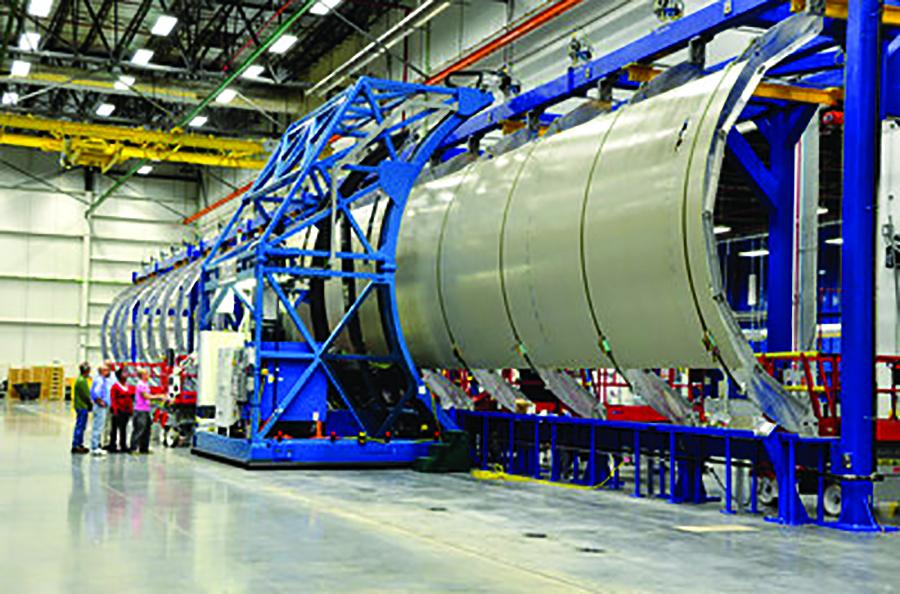
It was a foregone conclusion by the time Boeing CEO Dave Calhoun acknowledged in October that the Chicago-based OEM had lost commercial aircraft market share to its European rival.
Even before the COVID-19 pandemic, the grounding and production halt of the Boeing 737 MAX had spurred industry advisors to warn of a potential 60-40 split, or greater, between Airbus and Boeing in narrowbodies.
That is a monstrous shift from the traditional 50-50 split, but it comes from monumental changes. “Boeing’s struggles with the 737 MAX [have created] a once-in-a-generation opportunity for Airbus to gain significant market share in the narrowbody aircraft market,” Morgan Stanley analysts Kristine Liwag and Matthew Sharpe wrote Nov. 9. “Due to the long cycle and limited number of programs and players in aerospace . . . a strategic market-share move could have multi-decade implications.”
For aerospace suppliers struggling with the worst downturn in history, the market-share shift begs the question: Should suppliers shift to Airbus, too?
The temptation is there. “The last 18 months has seen Airbus gain a complete lead, and probably unassailable lead, over Boeing,” analyst Sash Tusa of Agency Partners told an Aviation Week webinar in November. “We are seeing Airbus-related suppliers looking more valuable than Boeing suppliers with same earnings, same revenue. Airbus has the backlog, Boeing does not—on narrowbody, Airbus has 60% of backlog. That shows how brutal the K-shaped impact on valuations can be.”
The reasons to consider a shift vary by supplier but start with the same consideration. If Airbus forces its customers to follow through and take delivery of A320-family aircraft, then those customers may defer or cancel any MAX orders they have, especially with the walk-away opportunity presented by the MAX’s grounding.
Morgan Stanley data shows that Boeing has 2,717 MAX-family orders through 2025, and 29% (791 aircraft) are from lessors or airlines that also have A320 orders. Indeed, so-called mixed airlines account for the largest part of the orderbook in 2023-25.
Before COVID-19 and the MAX grounding, the supply chain was the bottleneck and was hard-pressed to produce more than 120 narrowbodies a month.
In turn, experts suggest whichever OEM can push its supplier base to sustain a production rate of 60 aircraft a month or more first could “win” the race until future narrowbodies enter production. Airbus already is goading its suppliers to be ready for rate 47 by October 2021, while Boeing sees only rate 31 by “early” 2022—and even so, supplier confidence on hitting that mark is noticeably lagging (several analysts expect both OEMs will have to cut rates further).
At least one leading Boeing-oriented Tier 1 supplier, Spirit AeroSystems, is shifting to Airbus—although that has more to do with strategic planning that predated the MAX’s problems and COVID-19. The 737 family was responsible for 50% of Spirit’s annual revenue through 2019, and altogether Boeing was nearly 80%.
It made sense for Spirit to diversify toward Airbus, but what about other suppliers? The general answer so far—at least according to many analysts and consultants—is that they probably should not.
“I really don’t think so,” analyst Doug Harned of Bernstein told an Aviation Week webinar. To begin with, 40% of market share is a huge base. Further, “the share dynamic may be closer than people think it is,” he added.
Consultant Scott Thompson of PwC agreed in a separate interview. “We’re dealing with a duopoly, and market forces will drive it back to a 50-50 split,” he predicts. But, of course, how the balance is achieved could matter, he concludes.
Harned agrees some lower-tier suppliers could be affected if they are over-dependent on Boeing, or if Boeing’s tactics to regain market share put more pressure on suppliers. But he does not expect that. “Some smaller suppliers may have issues, but the pain will not get any worse and [the] trajectory will get better,” Harned said.
There are other factors that could make such shifts pointless. “Although it remains to be seen to what degree a market-share battle could play out between Boeing and Airbus, this dynamic bears watching, as there are no winners in a market-share battle,” Liwag and Sharpe said.
Aerospace manufacturing is often lamented as a slow-adapting, slow-moving industry. But in this case, many observers think it is best not to change and to let the current market-share disruption pass without re-architecting the supplier bases.






Comments